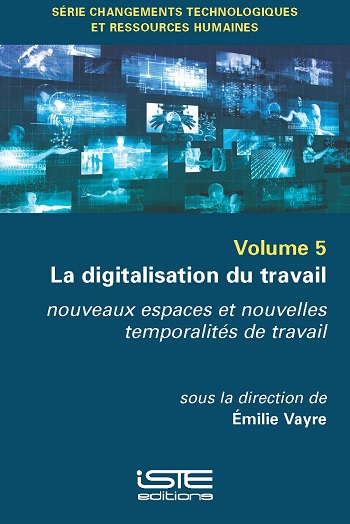- Home
- EN
- Kardham Group
- News
Work digitalization seen through the prism of the flex office
March 2022

We are pleased to present "The digitization of work, new spaces and new temporalities of work", a collective work to which Nicolas Cochard, its Research & Development Manager, contributed.
Published by ISTE under the direction of Emilie Vayre, professor of work and organizational psychology at the Université Lumière Lyon 2, " The digitization of work " lists contributions from international researchers and experts on the issues and impacts of recent or emerging forms of work: telecommuting, remote management, corpoworking, flex office, home-based work or nomadism. Chapter 7, co-authored by Nicolas Cochard and Delphine Minchella, is dedicated to the flex office and its challenges for organizations and users.
Understanding the magnitude of the challenges of the digitalization of work
The digitization of work, driven by new technologies and changing lifestyles, and amplified by the health crisis, has shattered work spaces and timeframes. The renewed interest in remote, hybrid, nomadic and flexible work, both inside and outside the office, is forcing organizations to completely restructure their spaces and review their modes of occupation. These transformations also impact the way each person relates to the organization and to work, management, and relationships, and influence individual and collective practices, the articulation of professional and personal activities, as well as health and quality of life at work.
"The digitization of work" aims to provide an account of the issues and impacts of recent or emerging forms of work through the contributions of eight international multi-disciplinary researchers and experts: work and organizational psychology, social psychology, ergonomics, information and communication sciences, or managerial sciences. Scientific knowledge and field practices are also put into perspective in order to better support the transformations likely to be implemented within organizations.
Three main themes are addressed:
- Part 1: the uses of technology for work purposes, especially informal uses, their organizational and managerial factors as well as their consequences on the quality of life at work and the health of employees;
- In part 2: the organizational, collective and individual issues of telework, in particular home-based working, and the reconstruction of social, temporal and spatial reference points that it implies;
- In part 3: the logics of development of new work spaces, flex office and coworking, their modes of appropriation and their psychosocial impacts. It is to this part of the book and more particularly to chapter 7, dedicated to the flex office, its developments and its effects on the organization of work and its users, that two specialists in the field have contributed: Nicolas Cochard, Head of Research & Development of the Kardham Group and Delphine Minchella, Lecturer and Researcher in Management at EM Normandie.
The digitalization of work seen through the prism of the flex office: challenges and many questions
In chapter 7 of "The digitization of work", Nicolas Cochard and Delphine Minchella look back at the implementation of the flex office, which consists of putting an end to the paradigm of the personal and assigned workstation. A mode of work organization that raises a multitude of questions: which type of flex to implement? What ratio of people to workstations? What organizational or even cultural ambition lies behind flex? How can we put in place a "flex mindset" that guarantees autonomy and the disconnection of place from activity? How can the organization of work be changed? How can we support managers? How can the economic input and the gain in use for the employee be brought together?
If the subject is topical, it must be noted that the research that has been carried out to date in management sciences remains rather limited. This research has been developed essentially through two prisms: corporate real estate and organizational theories.
Nicolas Cochard and Delphine Minchella review the main scientific contributions related to the flex office, first by reviewing the genesis of this spatial work organization and then by proposing a summary of the opportunities and risks related to the flex office, based on research. Finally, they discuss the probable reasons for the acceleration of the flex office development with the Covid-19 health crisis. It is likely that the widespread use of hybrid work coupled with falling occupancy rates is making it increasingly difficult to persist in assigned positions. By reducing their square meters and reallocating their individual surfaces in favor of collective surfaces, companies would find in the flex office an organization of work at the crossroads of many expectations, economic, organizational, environmental and quality of life at work.
Show more
 |
The digitization of work, new spaces and new work temporalities Collection: Innovation, Entrepreneurship and Management |

